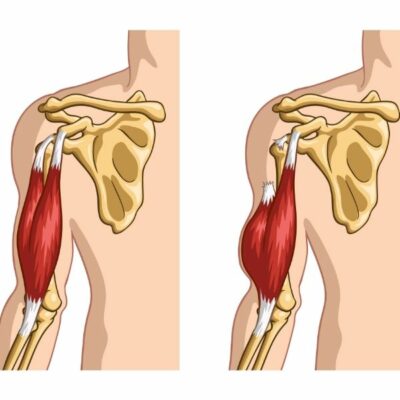Bicep Tendon Injury Specialist

Are you an athlete who participates in sports that involve heavy overhead lifting? If so, you may be at risk of tearing your biceps tendon. A biceps tear can occur from repetitive overuse, a fall, heavy lifting or degeneration of the tendon over time. Biceps tendon injury specialist, Dr. James Mazzara provides diagnosis and both surgical and nonsurgical treatment options for patients in Manchester, South Windsor, Enfield, Glastonbury and surrounding Hartford communities who have suffered a biceps tendon injury. Contact Dr. Mazzara’s team today!
Biceps Tendon Injury; how to know if you have one and what to do about it.
What is a Biceps Tendon Injury?
The biceps are two (thus the term “bi”cep) muscles that attach separately at the top of the shoulder. One part of the muscle; via the tendon, called the long head tendon, attaches directly to the labrum and passes inside the shoulder joint, itself. The second part of the muscle, called the short head, attaches to a finger-like protrusion on the shoulder blade called the coracoid process. The two muscles then run down the arm, merge into one muscle and attach again just past the elbow. The biceps are the muscles responsible for bending the arm at the elbow and rotating the upper arm. Biceps are used countless times a day and relied on for a huge range of activities. Due to their location and constant demand, biceps tendon injuries are common and can be a cause of sudden, severe shoulder or elbow pain.
Biceps tendon injuries can occur in the shoulder or the elbow. These tendons may fray from their attachment site from a work injury, sports injury, fall or extreme wear and tear. Shoulder specialist, Dr. James Mazzara helps patients in Manchester, South Windsor, Enfield, Glastonbury and surrounding Hartford communities return to their normal activities following a biceps tendon injury.
What are the Symptoms of a Biceps Tendon Tear from the Shoulder?
Biceps tendon tears attached to the shoulder (long head tendon) are most common, while tears in the short head, or the area attached near the elbow, seldom happen.
Common symptoms of a torn bicep include:
- Sudden, intense pain in the upper arm or site of the tear. The pain may resolve in a few days.
- Hearing or feeling a “pop” when a tendon tears.
- Cramping in the biceps.
- Pain and tenderness at the shoulder and/or elbow.
- A physical change in the front of the arm, sometimes a bulge due to the fact the tendon is no longer holding the muscle in place. This is commonly called a “Popeye muscle.”
How is a Biceps Tendon Injury Diagnosed?
For patients in Manchester, South Windsor, Enfield, Glastonbury and surrounding Hartford communities, Dr. Mazzara will perform a physical exam. If a torn biceps tendon is suspected, an ultrasound in the office by Dr. Mazzara may reveal a rupture of the tendon or rotator cuff. An MRI may also be ordered to confirm the diagnosis and show the extent of the tear.
What is the Treatment for a Biceps Tendon Injury?
Non-Surgical Treatment
For biceps tendon injuries that are minor, treatment with ice, rest and anti-inflammatory medication will be prescribedNot all biceps ruptures require surgery; some may be associated with rotator cuff tears. Patients are advised to avoid heavy lifting and strenuous activity until the tear heals completely. Physical therapy is then recommended to regain strength and flexibility.
Surgical Treatment
Biceps tendon injuries do not always require surgical intervention. Dr. Mazzara will discuss patient options based on age, activity level and severity of the injury. Tears that occur in the elbow almost always require surgery and should occur within two weeks of the injury.
A torn biceps tendon in the shoulder can be repaired with minimally invasive surgery, or arthroscopic surgery, using minor incisions to re-anchor the torn tendon back to the bone. If only a small part of the tendon is torn, a simple smoothing (debridement) of the torn fibers may be all that is required. If a large portion of the tendon is torn, the damaged part may be removed from inside the shoulder joint and then the remaining tendon would be attached to the upper arm bone (humerus) This procedure is called biceps tenodesis.
For more information on biceps tendon injuries or other biceps tear injuries, please contact the orthopedic office of Dr. James Mazzara, shoulder specialist serving patients living in Manchester, South Windsor, Enfield, Glastonbury and surrounding Hartford Connecticut communities.
